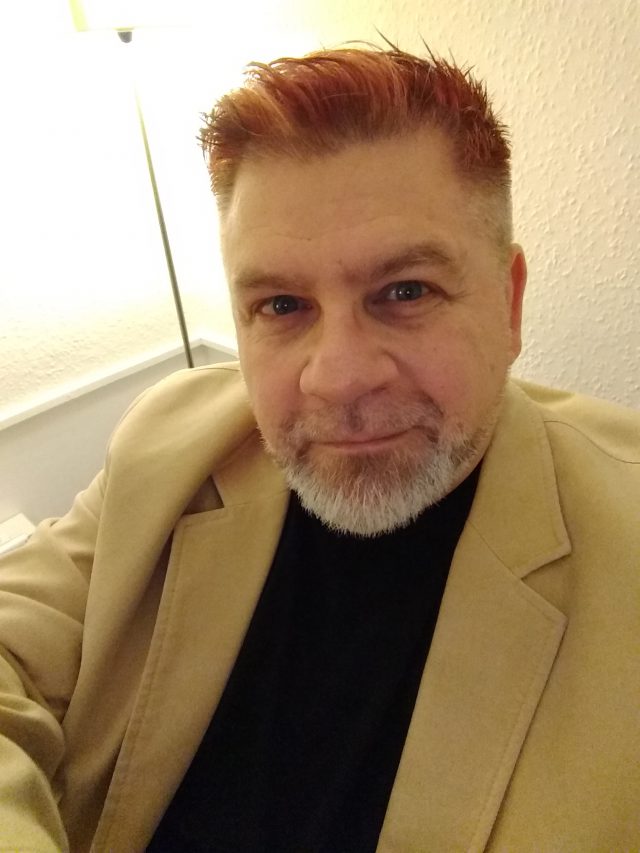
5 Easy Steps to Begin Counselling with Dean Richardson
Easy Steps on 'How to Begin Counselling': LGBTQ+ Couples & Groups with Dean Richardson MNCPS (Accred/Reg).Bespoke Counselling for LGBT/Q+. Let's discuss the Five Easy Steps you'll take to begin counselling. Arrange your first counselling session (along with your partner(s)) with your new British LGBT/QIA+ Relationship Counsellor. Begin counselling as soon as next week with your ideal counsellor, who has over 25 years of the expertise you need...Ready to Begin Counselling?
You’re thinking about meeting with LGBT/QIA+ Relationship Counsellor Dean Richardson MNCPS (Accred/Reg) for Bespoke Relationship Counselling. You’re in a same-sex (or mixed, or queer…) couple relationship, throuple relationship, or a polyamorous / non-monogamous polycule (or group). You’ve done your research and it seems like Dean Richardson is offering the service that’s right for you all…
…so how do you get things started?
Your First Three Easy Decisions
The following questions will assist you in determining whether or not Dean’s counselling approach is the one you want for you and your partner(s).
1️⃣ Does Dean’s Approach to Counselling seem right for you?Tip: refer to Dean’s “Why Choose My Service” page. It’s advisable to confirm that Dean is offering the service you think he’s offering. Don’t worry if you feel like you’re not quite understanding the details of Dean’s approach to therapy. A good way would to notice your sense of “Yes, Dean seems good for us” or “No, he doesn’t”. We can work through all the details together when you make contact, and you’ll not be committing to more sessions than you find is helpful.
2️⃣ Are you Available to Attend Weekly Appointments together with Dean?Tip: Appointments are weekly, and scheduled automatically for the same time/day and same location/medium. There are exceptions for planned breaks/holidays and other absences (details of which you will receive in a PDF document before you meet with Dean). Refer to the Appointments Table below to see which appointments are currently available. Some times will become available in the future, and you can be on the waiting list for these.
3️⃣ Are you Able to Afford Dean’s Counselling Session Fees?Tip: refer to Dean’s Counselling Fees page. Private counselling attracts a fee payable before each weekly session. Fees vary depending on your choice of service & session length: individuals & couples may choose either 50 or 90 minute sessions, but all group sessions are 90 minutes.
Fortunately, with this trustworthy service…
- There is no onboarding quiz that makes unrealistic promises to match you to a “perfect” counsellor 👎.
- There are no demands for your credit-card details (ever!) before you’re allowed to make contact with the counsellor 👎.
- There are no compulsory forms to complete that see you giving a staggering amount of personal information (not being told for what marketing purposes) 👎.
What a relief!
What are you thinking so far
So, when considering the above three introductory points… are you getting a sense of a “Yes” or a “No” ?
We’re thinking: ‘Yes’
If you reply “Yes” to all questions then continue reading to learn how straightforward it is to set-up your first session of LGBTQ+ Relationship Counselling with Dean Richardson…
We’re thinking: ‘No’
If you reply “No” to any question, then perhaps Dean is not be the right counsellor for you. It might be helpful to consider an alternative relationship counsellor as discussed here…
Five Easy Steps to Starting Counselling
⭐ STEP ONE: Decide – together – that you want to engage Dean as your couple counsellor.Both partners must wish to engage in the process autonomously. Counselling cannot make someone change their position nor behaviour in a relationship.
⭐ STEP TWO: Perhaps budget for around 6 sessions (scheduled weekly).This is not a limit (a maximum nor a minimum) number but, rather, a gauge. By this number of sessions, you may be in a clear, informed position to be aware of the direction your relationship wants to go. It’s also possible you may not need to meet further with your counsellor, but you’re very welcome to continue when it feels helpful.
⭐ STEP THREE: Decide upon which day/time you’d prefer to meet.Appointments are listed on my Available Appointments page. Tip: have a couple of alternative choices in case your first choice isn’t available. Choose a time you can attend on a weekly basis.
⭐ STEP FOUR: Get in contact… … using my straightforward contact form.
⭐ STEP FIVE: If still available, Dean will reserve your preferred appointment(s). You’ll be informed about the reservations using email, be sent information about the counselling arrangements, and if you approve you’ll send send a £30 deposit* (payable online, using my Secure Online Payments) page to confirm the first session. We’ll then meet.
After Making Contact
After your contact form has been received you will receive an email acknowledgement. This email will include…
Either:-
- A confirmation of the requested service, along with appointment date & time.
- Detailed information about the counselling engagement agreement (helping you make an informed decision).
- Information on how we schedule our first session.
- How to pay your first-session £30 deposit* (refundable) to secure the first session.
Or:-
A confirmation of your contact form request, and a discussion about possibilities should the appointment not be available.
Should we proceed to arranging an initial appointment, and you’ve sent your deposit, you will receive a final confirmation email. This email will include:
- Confirmation of the appointment.
- Information on our virtual meeting room (e.g. a Zoom or Skype Meeting Room URL etc).
- Information on what to expect when joining the session meeting room
- A few final preparation/reminder details.
Before the first session begins, you will transfer the outstanding balance of your session fee.
We’ll then meet as planned and begin our first round of therapy conversations.
FYI: It usually takes about a week to arrange a first session (email exchanges, arranging to pay & receive the deposit, making arrangements with service providers, etc).
*DEPOSIT NOTE: your deposit is your way of confirming attendance for our first session and is taken off the first session (leaving the remainder to pay on the day). A deposit is not required for subsequent sessions; you will pay the full fee prior to each weekly session.
First Counselling Session: What Happens?
During our first counselling session, we’ll have some conversations::
- The problems this relationship is bringing into counselling.
- How this relationship works (or doesn’t seem to work).
- What solutions have been tried (and what was observed/learned… if anything).
- At the end: a review of our first session; what was our initial impressions and whether we think it’s a good-enough idea to continue.
We’ll have conversations about the relationship’s “system” (basically learning about behaviour: who does what and what is the response). We’ll chat about how we might collaborate (“might” because those in the relationship are heavily involved in the process itself and may not yet know their part in the difficulties yet). We’ll start by figuring out what we think our therapeutic collaboration will reveal.
We’ll make a note of what we’ve learned by the end of our first session. We’ll see if we can decide whether or not to continue with sessions. If we can’t decide, we’ll consider adding another session (etc) until we see our work taking shape, or it becomes evident that we’re not able to work together successfully.
If we continue counselling sessions, we’ll uncover (in deeper, useful detail) what are the faults in the relationship’s system. We’ll uncover new knowledge that will lead to new possibilities and ways of behaving in this relationship.
Weekly counselling sessions will follow until the couple or group becomes aware that they’re capable of dealing with their relationship problems alone. I often say: my intention is to become redundant to the relationship’s needs. We’ll then devise a strategy for wrapping up our meetings.
Ending Counselling Prematurely
The couple or group who have contracted the counsellor may make an informed decision to bring counselling to a close at anytime they wish. Individual partners may choose to leave early:
- Couples: if your partner leaves early then Dean will work with the remaining partner (eg up to 6 sessions) to bring the counselling to a close. This is because the contracting relationship has left and the individual remaining has the option to continue individual counselling with another counsellor (if they so wish).
- Groups: provided there is a recognisable “group” left then therapy may continue (we’ll discuss options at the time). If no recognisable group remains we’ll work for up to 6 sessions to bring the counselling to a close. This is because the contracting group has left and those remaining have the choice to enter counselling with another counsellor (if they so wish).

Beginner’s Overview of Relationship Counselling
There are three main parts in the process of LGBT/QIA+ relationship counselling.
We’ll begin to embrace this framework right from our very first session:-
A) Discovering the “Focus”
A major problem with relationship conflicts is when the parties involved are pretty sure they understand the problems.
Yet, holding such a belief doesn’t seem to help address nor resolve their relationship difficulties.
I’d suggest that perhaps the lovers don’t really understand what is happening between them. The behaviour alone is insufficient information.
Without having a true picture of the problem, how could a couple or group enact a satisfactory resolution?
So, our first part of counselling will see us working together to discover the details of the relationship’s conflicts and functions. What is the counselling going to focus on?
Dean is a skilled and sympathetic interviewer. He will help the couple carefully drill down deeper into the relationship’s behaviour. This helps to begin to discover what lies at the root of conflicts. With more knowledge, the couple and Dean begin to make better, more informed decisions about how they might proceed.
B) Our Core Work Together
Once the focus for relationship counselling is better understood, the couple have a choice…
1) The couple or group may choose to work on the focus themselves. They take no further counselling sessions .
2) The couple or group may choose to continue in counselling with Dean, working weekly on the relationship’s discovered focus.
There is no set time limit for this work. Each relationship goes at its own pace.
Working with Dean may see the partners:-
- …learn to observe their relationship’s behaviour as a tool to understanding what’s happening.
- …learn to recognise their Individual Instant Responses to their partner, the ones that lead to unhelpful responses, and to consider how what might change.
- …learn how to use empathy to appreciate their partner’s/partners’ point of view, without feeling attacked, or put down, or losing their equally valid point of view.

C) Bringing our Therapy Work to a Close
It’s not the aim of relationship counselling to resolve all the problems. A healthy, effective aim can be to reach a place where the relationship is behaving well enough for the partners to leave counselling whilst continuing on their journey alone.
Couples and Groups may leave counselling knowing that the main conflicts have been addressed, with their relationship more in harmony and their difficulties under their management through newly developed skills.
When the partners are working well away from the counselling sessions, they may decide to bring up the idea of ending counselling back into session. The last set of counselling sessions may be arranged and the partners and Dean can look back over the work. We notice anything that hasn’t been worked on or completed (an “unfinished business”), and the partners prepare to leave counselling.
The therapy continues after counselling has ended, but now the “therapy” in the hands of the partners themselves. No need to return back to counselling for top-up sessions (as if the relationship would somehow run out!) or further intervention from a professional.





